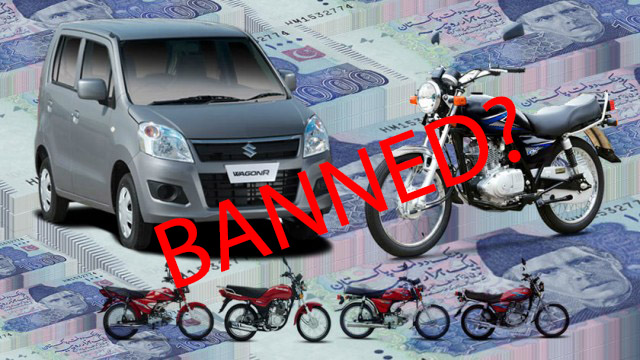پاکستان کی آٹوموٹو مارکیٹ نے مالی سال 2017-18ء میں زبردست نمو دیکھی اور 2,60,000 یونٹس کی فروخت کے ساتھ سال بھر میں فروخت کی نئی بلندیوں کو چھوا۔ گاڑیوں کی زبردست طلب کے باوجود شرحِ نمو نے زبردست کمی کا مشاہدہ کیا۔ آٹوموٹو مارکیٹ کو پہنچنے والے اس دھچکے کو 2008-09ء کے مارکیٹ زوال سے نسبت دی جا سکتی ہے۔ اس مخصوص سال میں مارکیٹ 82,844 یونٹس کی کم فروخت دیکھی تھی جو اس سے پچھلے سال 1,64,650 یونٹس تھی۔ تازہ ترین صنعتی رپورٹ ظاہر کرتی ہے کہ تین مقامی آٹو موبائل اسمبلرز ہونڈا، ٹویوٹا اور سوزوکی نے اپنی گاڑیوں، وینز اور SUVs کی فروخت میں اگست کے مہینے میں 17 فیصد کی اچانک کمی ملاحظہ کی۔
مقامی طور پر اسمبل شدہ کاروں کی فروخت میں کمی
پاک سوزوکی پاکستان میں کئی سالوں سے سستی و کم قیمت گاڑیوں کے زمروں میں اجارہ داری رکھتا ہے۔ پچھلا مہینہ مقامی اسمبلرز کے لیے ڈراؤنے خواب سے کم نہیں تھا کیونکہ اس میں پاکستان میں گاڑیوں کی فروخت میں 23.4 فیصد کمی دکھائی دی۔ انجن گنجائش کے اعتبار سے سوزوکی کی اسمبل کردہ 1000cc سے کم کی گاڑیوں نے سب سے زیادہ 26 فیصد کمی دیکھی جبکہ اگست 2018ء میں پک اپ راوی نے اپنی فروخت میں 16 فیصد کمی ملاحظہ کی۔ سوزوکی کی 1000cc کی گاڑیوں میں (ویگن آر اور کلٹس) نے گزشتہ ماہ فروخت میں 13.6 فیصد زوال دیکھا۔اسی طرح 1300cc اور اس سے زیادہ کی کیٹیگری کی گاڑیاں اسمبل کرنے والے ہونڈا اور ٹویوٹا نے بھی پچھلے مہینے اپنی فروخت میں زبردست کمی پائی۔ ٹویوٹا نے پاکستان میں اپنی کاروں اور جیپوں کی فروخت میں 8 فیصد کمی دیکھی۔ جبکہ 4WD کیٹیگری میں آنے والی تمام آٹوموٹو مینوفیکچررز کی SUVs نے فروخت میں 18 فیصد کا متاثر کن اضافہ ملاحظہ کیا۔
پاکستان میں درآمد شدہ کاروں کی فروخت کی کہانی بھی کچھ مختلف نہیں۔ درآمد شدہ گاڑیوں کے شعبے میں زبردست فروخت کے کئی ماہ کے بعد یہ رحجان بالآخر تبدیل ہوا اور گزشتہ ماہ ان کی فروخت میں بھی نمایاں کمی ہوئی۔ آخر کیا تبدیلی آئی ہے کہ جس کی وجہ سے ہر ماہ فروخت ہونے والی گاڑیوں کی تعداد میں نمایاں کمی ہوئی ہے؟ پاکستان میں آٹوموٹو مارکیٹ کی نمو میں آنے والے اچانک زوال کے چند عوامل ہیں۔ یہ تمام عوامل مل جل کر مارکیٹ پر اپنا اثر ڈالتے ہیں کہ جنہیں ہم اعداد و شمار میں دیکھتے ہیں۔ گاڑیوں کی قیمتوں میں مسلسل اضافے نے فروخت کو کسی حد تک متاثر کیا۔ امریکی ڈالر کے مقابلے میں روپے کی گھٹتی ہوئی قدر کے ساتھ آٹوموبائل اسمبلرز نے سال بھر تین بار اپنی گاڑیوں کی قیمتوں میں قابل قدر اضافہ کیا۔ لیکن گاڑیوں کی بڑھتی ہوئی طلب کے ساتھ آخر اچانک گاڑیوں کی فروخت کیوں رُک گئی؟
نان-فائلرز پر پابندی کی پالیسی:
حکومت پاکستان نے ایک نئی پالیسی کا اعلان کیا جس کے مطابق نان-فائلرز کو نئی گاڑی خریدنے کی اجازت نہیں دی جائے گی چاہے وہ مقامی طور پر اسمبل شدہ گاڑی ہو یا درآمد شدہ۔ نان-فائلرز پر پابندی کی یہ پالیسی یکم جولائی 2018ء سے لاگو ہوئی۔ اس نے پاکستان میں گاڑیاں بنانے والوں کو سخت دھچکا پہنچایا۔ انہیں نان-فائلرز کی جانب سے پہلے سے دیے گئے ہزاروں آرڈرز منسوخ کرنا پڑے۔ اس کے علاوہ مختلف مخصوص عوامل ہیں جن میں صارفین کی جانب سے گاڑیوں کے نئے ویریئنٹ کی توقع اور عید کا موقع شامل ہیں جنہوں نے کم فروخت میں حصہ ڈالا۔ لیکن نان-فائلرز پر نئی گاڑیاں خریدنے کی وہ پالیسی ہے جس نے پاکستان کی آٹوموٹو مارکیٹ کی کمر توڑ کر رکھ دی۔
یہ امر قابل فہم ہے کہ 1000cc یا کم کے زمرے میں ان صارفین کی اکثریت تھی جو ریٹرنز فائل نہیں کرتے یا ٹیکس نہیں ادا کرتے۔ یہ خاص پابندی پاکستان میں مارکیٹ کو نمو میں سخت متاثر کرنے جا رہی ہے کیونکہ ملک کی کل آبادی کا 1 فیصد سے کم ٹیکس فائلرز ہیں۔ یہ قدم سرمایہ کاروں کو استعمال شدہ گاڑیاں نان-فائلرز کو فروخت کرکے بڑا منافع حاصل کرنے کی حوصلہ افزائی کرتا ہے۔ یہ پالیسی نہ صرف پاکستان میں موجودہ آٹوموٹو اسمبلرز کو بلکہ پاکستان میں بڑی سرمایہ کاری کے ساتھ داخل ہونے والے نئے سرمایہ کاروں کو بھی متاثر کرتی ہے۔ طویل المیعاد سرمایہ کاریوں کے حامحل رینو، کیا، ہیونڈائی اور نسان جیسے برانڈز اس پالیسی کے تحت اپنی گاڑیاں فروخت کرنے کے آغاز پر زبردست دھچکا پائیں گے۔ حکومت پاکستان 2023ء تک پانچ لاکھ گاڑیاں تیار کرنے کا ہدف رکھتی ہے، جو ہرگز حقیقت کا روپ نہیں دھار سکتا اگر یہ پالیسی جاری رہتی ہے تو۔
اس بارے میں اگر آپ کوئی رائے رکھتے ہیں تو نیچے تبصروں میں پیش کرنا مت بھولیں۔


